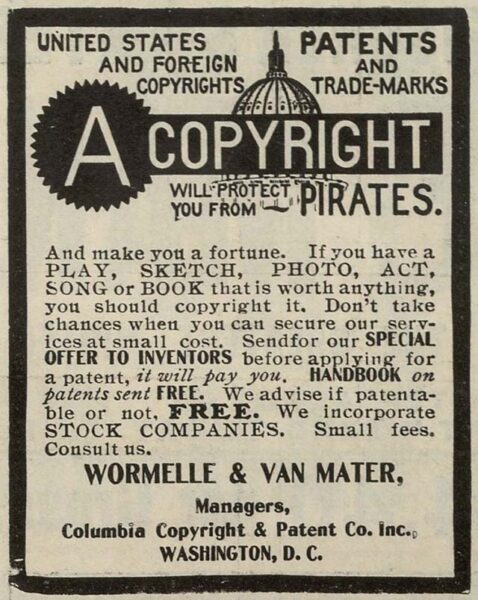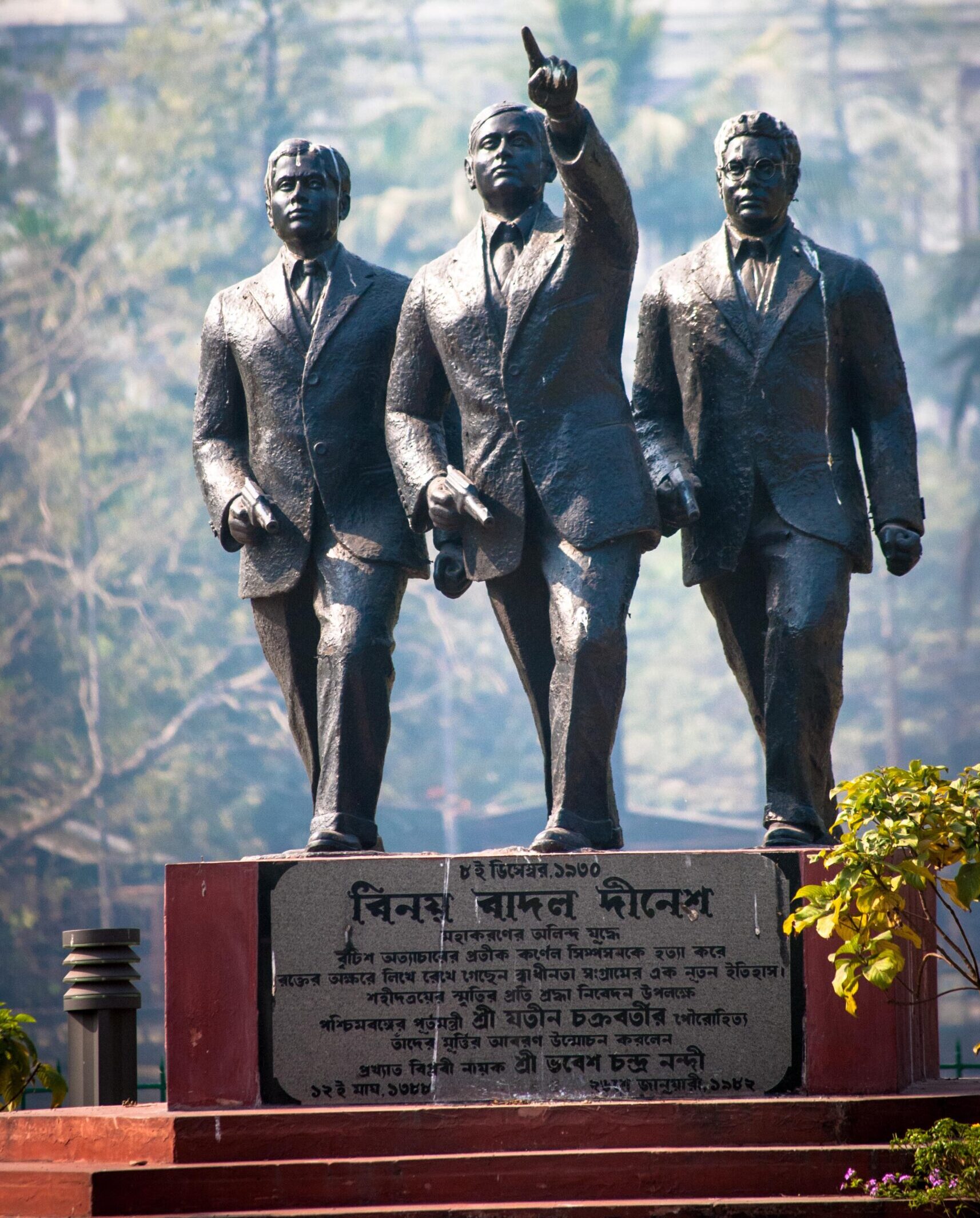
Hoping to lure artists anxious that other acts would steal their work, copyright firms in the early 20th century promised to defeat “pirates.” The law has changed greatly since this ad was published in 1906.
Imagine this situation: a publisher with an established track record of high-priced, poorly edited, and shoddily bound products takes your doctoral dissertation and publishes it under a new, sexier title (but otherwise unaltered) without your permission. Or maybe you are hoping to place a revised version of your dissertation with a university press and want to keep the online version hidden from public view while you seek a publisher. Or suppose someone translates your historical essay into a language you do not understand and publishes it without your permission, leaving you unable to assess the translation’s faithfulness to your original work. As an author, what options are available to you under copyright law? In other words, why are your rights as a copyright holder important to you as a historian?
For those of us who write for publication, copyright law is perhaps a bit like metabolism: we find it not terribly interesting, and when we do think about it we struggle to understand it—yet it is tremendously important to us. As writers and scholars, copyright law shapes our choices and both broadens and constrains our prerogatives in ways that have an impact on our work every day.
For example, it is copyright law that allows us to select publication venues for our work, and in fact to say whether, when, and how our work will be published at all—rights that are particularly important for those on the tenure track, where type and venue of publication can significantly affect committee decisions. Copyright law gives us the right to say whether our work will be translated, and if so, which translation may legally be published. It gives us a degree of control over the creation of derivatives based on our work, and over its commercial exploitation. It gives graduate students the right to embargo their dissertations while they look for a publisher (or longer).
These rights can be particularly important for humanists, for whom the specific expression of an idea may be just as important as the idea itself. The primary concern of scientists tends to be with establishing priority and originality in the content of their work, rather than with protecting the manner in which the work is described. But for humanists, the expression itself is very often fundamental to the work’s value.
Of course, the rights of a copyright holder are by no means unlimited—nor would most of us want them to be. The doctrine of fair use is well established both in statute and in case law, and it provides for certain kinds of limited copying and reuse without the copyright holder’s permission, such as one-off copying for personal use and limited kinds of public performance in educational settings. The fair use doctrine seeks to create an appropriate balance between the legitimate needs of content creators and those of its consumers.
There are many opinions on whether copyright law, as currently written, is well suited to our increasingly online information environment and to the evolving needs of authors, readers, and researchers. Not all authors want to retain the exclusive prerogatives that the law automatically gives them. Some would like to make their work more widely available and more freely reusable. Some would like simply to place their work into the public domain and let it be reused entirely without restriction. Others would like to make it available for unlimited copying and redistribution; still others might wish to restrict commercial reuse but allow noncommercial reuse without limitation.
For those who wish to make their work more freely available and reusable, the emergence of Creative Commons (CC) licensing has been a tremendous boon. By providing (at no charge) a suite of license choices represented by ingeniously simple symbols, CC makes it easy for authors to grant some or all of their copyright prerogatives to the public. The most restrictive of these licenses is represented by “CC BY-NC-ND” (meaning that anyone may copy and redistribute the work without restriction, but may create derivatives or make commercial reuse of the work only with the author’s permission).
There are organizations working to make Creative Commons licensing mandatory rather than optional. For historians in particular, this may be cause for concern.
The least restrictive is “CC BY,” which allows the public to reuse the work in any way desired, including commercially, as long as the author is acknowledged as the creator of the original version. (CC also provides the option of placing one’s work into the public domain by means of the “CC0” designation, which is not actually a license at all, but rather a formal waiver of copyright.) CC licenses are used extensively in Perspectives on History, as a matter of fact—this essay is available under a CC BY-NC-ND license.
While the availability of CC licensing is a great benefit to authors who choose to abdicate some or all of their exclusive copyright prerogatives, it is important to know that there are individuals and organizations hard at work to take that choice away from authors, with increasing success. For example, in 2014 the Gates Foundation announced that it would require CC BY licensing of all publications resulting from research that it funds. The Ford Foundation followed suit in early 2015.
For now, these policies primarily affect authors in the hard sciences, but humanists and social scientists would be well advised to inform themselves about these issues and to be involved in the relevant campus conversations—especially those that are likely to result in policy changes. This will likely involve initiating dialogue with faculty in the sciences and social sciences, as well as administrators in the Office of Research. Academic libraries very often have librarians with specialist expertise in this area as well.
It is also important to understand that the issues of CC licensing and of open access to scholarship (OA) are closely but ambiguously intertwined. The two most commonly accepted definitions of OA emerged from the Budapest Open Access Initiative (2002, reaffirmed in 2012) and the Berlin Declaration on Open Access (2003). Both define OA as meaning not only free access to content, but also public reuse rights that go far beyond traditional fair use allowances (while stopping slightly short of those defined under CC BY). However, many OA advocates today consider anything less than CC BY to fall short of true OA; their influence can be seen, for example, in the publishing policies of the Gates and Ford Foundations.
When it comes to OA and licenses, one area of debate concerns graduate theses and dissertations. It has long been traditional to make printed copies of locally produced theses and dissertations available to the public in the academic library of the graduate student’s own institution, but with the move from print to electronic submission and processing, electronic copies that can be freely copied and redistributed globally are available to the public. For some students this is a welcome development; for others it is cause for concern; still others are not aware of the issue at all. In light of this, in 2013 the American Historical Association issued a recommendation that graduate students in history be allowed to embargo their dissertations for up to six years if they so choose—a recommendation that met with significant alarm and derision in the OA community.
Copyright law allows student authors to say whether their dissertations will be made publicly available and to put certain restrictions on their reuse. But with the migration of dissertations to the digital realm, depositing one is now almost invariably a matter of making it freely available to all online. Graduate schools commonly require this, and at least one—Duke University—goes further, requiring not only that student authors make their dissertations freely available to all, but also that they do so under the terms of a Creative Commons license.7 Such a requirement is fully within the school’s legal rights, but matriculating graduate students (like all other authors) would be well advised to make certain they understand what will be required of them with regard to their work.
All authors, in fact, should be familiar with the relevant issues and controversies currently playing out in the world of scholarly communication, no matter one’s opinions about OA, copyright reform, and intellectual freedom. The resolution of these issues will have significant impacts on the rights and prerogatives of authors in the future.
Rick Anderson is associate dean for collections and scholarly communication in the J. Willard Marriott Library at the University of Utah, as well as president of the Society for Scholarly Publishing.
This work is licensed under a Creative Commons Attribution-NonCommercial-NoDerivatives 4.0 International License. Attribution must provide author name, article title, Perspectives on History, date of publication, and a link to this page. This license applies only to the article, not to text or images used here by permission.


